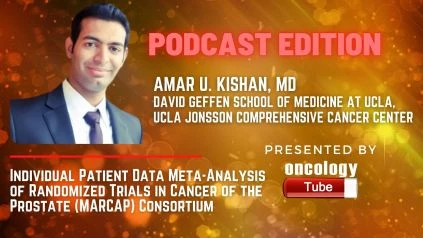Amar U. Kishan, MD, Associate Professor, is the Vice Chair of Clinical and Translational Research and Chief of the Genitourinary Oncology Service for the Department of Radiation Oncology at the David Geffen School of Medicine at UCLA and the UCLA Jonsson Comprehensive Cancer Center speaks about the ASTRO 2021 Abstract Individual Patient Data Meta-Analysis of Randomized Trials in Cancer of the Prostate (MARCAP) Consortium.
Link to Abstract:
https://plan.core-apps.com/myastroapp2021/abstract/3a92a692-4d67-4c3e-8090-17b848cb1ee5
Body:
Purpose/Objective(s):
To analyze the impact of androgen deprivation therapy (ADT) use and duration with definitive radiotherapy (RT) in localized prostate cancer in the first global individual patient data (IPD) meta-analysis of randomized trials.
Materials/Methods:
International trial groups (NRG/RTOG, EORTC, TROG, DART/GICOR, and ICORG) founded the MARCAP Consortium. For three pre-specified meta-analyses, IPD for 10,131 patients enrolled across 11 RT trials was available: addition of ADT to RT (5 trials; n=4736), addition of long-term adjuvant ADT (12-30 months) to short-term ADT (4 trials; n=3674), and addition of longer neoadjuvant ADT (3-7 months) to short-term ADT (3 trials; n=2213). Overall survival (OS) was the primary endpoint in all meta-analyses, with metastasis-free survival (MFS) as a secondary endpoint. Interaction experiments were performed between treatment and dose-escalated RT (74 Gy in 2 Gy halves).
Results:
The addition of ADT to RT improved 12-year OS (absolute 7.2 percent, HR 0.87, 95 percent CI 0.8-0.95) and 12-year MFS after a median follow-up of 12.0 years (absolute 8.3 percent, HR 0.85, 95 percent CI 0.79-0.92). Prolongation of adjuvant ADT increased 12-year OS (absolute 6.3 percent, HR 0.86, 95 percent CI 0.78-0.94) and 12-year MFS after a median follow-up of 10.9 years (absolute 6.3 percent, HR 0.83, 95 percent CI 0.77-0.90). Prolongation of neoadjuvant ADT was not linked with a meaningful benefit in any endpoint after a median follow-up of 10.3 years (MFS HR 0.95, 95 percent CI 0.83-1.09; OS HR 0.94, 95 percent CI 0.82-1.09). On subgroup analysis, there was no evidence of a treatment effect interaction (OS p-interaction 0.59) or adjuvant ADT prolongation between RT dose and ADT use (OS p-interaction 0.59). (OS p-interaction 0.13). Adjuvant ADT prolongation enhanced OS considerably in the case of dose-escalated RT (HR 0.70, 95 percent CI 0.53-0.92).
Conclusion:
This study provides the greatest evidence to date to support the use of ADT in localized prostate cancer, as well as the extension of adjuvant ADT to at least 18 months in conjunction with definitive RT. Regardless of RT dose-escalation, the relative advantage of ADT usage and adjuvant ADT extension was consistent. Prolonging neoadjuvant ADT beyond 2 months, on the other hand, did not improve survival results and should not be used frequently.

